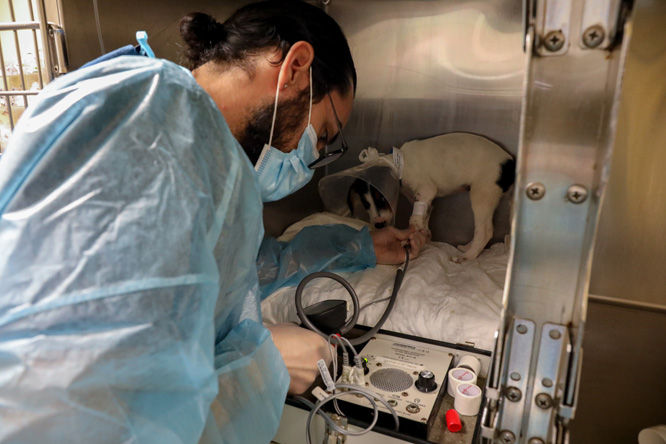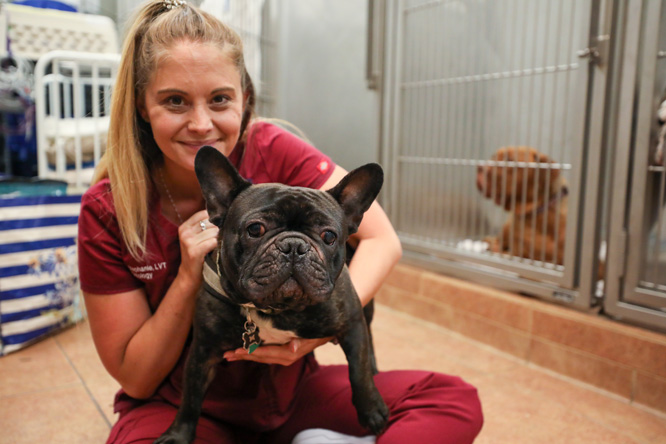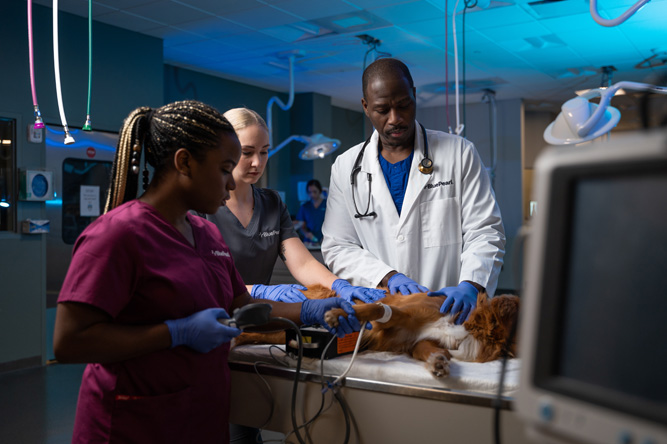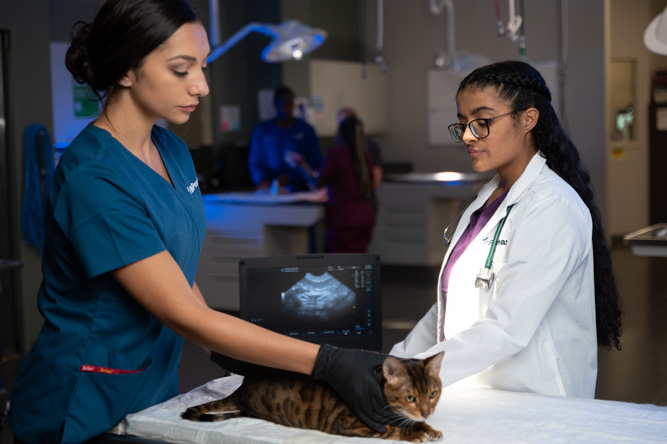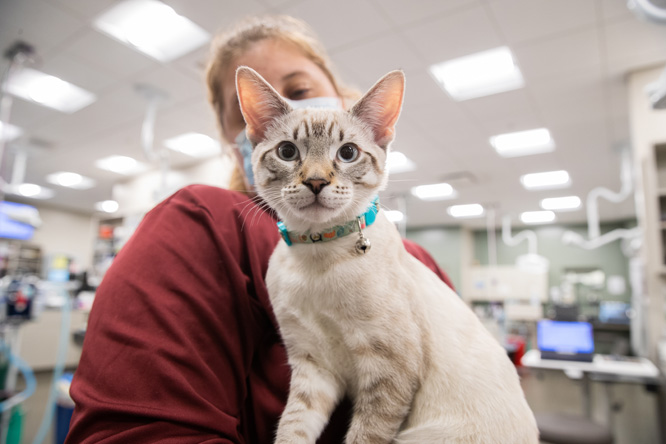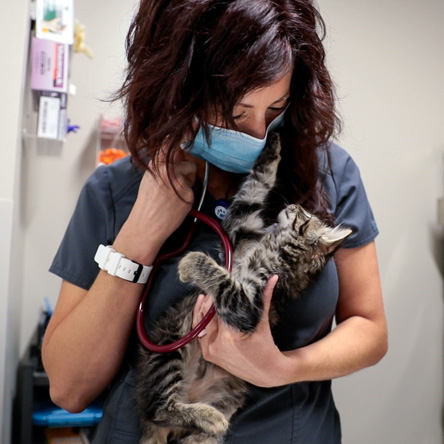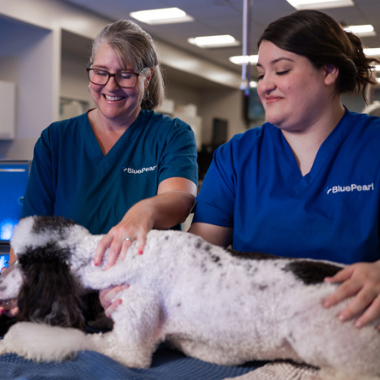Pet critical care by BluePearl.
Pet emergencies can be scary – we’re here to help you handle them.
We understand that seeing your pet sick, hurt or in distress can be stressful – especially if you don’t know what’s wrong. Fortunately, our experienced critical care clinicians are prepared to take action to provide lifesaving care

Conditions we treat.
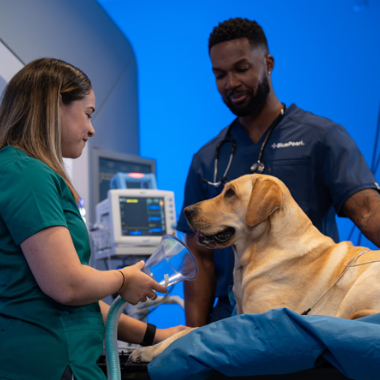
If your pet is experiencing a critical condition, you’ll have an entire veterinary team helping them so you can get back to what matters most – spending precious moments together.
Common cases that we see in the ICU include:
- Post-surgery recovery
- Trauma
- Sepsis
- Respiratory distress
- Pneumonia
- Shock
Services we offer.
Your pet will receive unparalleled medical care during their time at the hospital (and they’ll be spoiled with love and attention, too).
Advanced diagnostics
Your pet can’t tell us what’s wrong, so we use sophisticated diagnostics and imaging tools to uncover the source of the problem.
- Blood/urine testing
- Electrocardiography (ECG)
- Endoscopy
- Ultrasound
- Radiography (x-rays)
Treatment plans
Just as no two patients are the same, neither are their treatment plans. Our critical care team has experience with a range of advanced procedures and minimally invasive care options to get your pet on the path to wellness, including:
- Blood transfusions
- Electrolyte replenishment
- Oxygen therapy
- Breathing support
- Catheterization
- Nutritional support
- IV fluid therapy
Our board certified specialists and critical care team.
Experience makes all the difference.
Our critical care team is made up of veterinarians, vet technicians and assistants, and support staff with rigorous training and experience in specialty medicine. The team works hand in hand to provide the comprehensive, compassionate care your pet needs and deserves. Because we’re a multidisciplinary hospital, the team can consult the expertise of other specialty departments, too.
Adriana Alfonso Castro
DVMDr. Adriana Alfonso Castro is a resident in our critical care service.
- Internship, Small Animal Medicine & Surgery, BluePearl Pet Hospital, Clearwater, FL
- Doctor of Veterinary Medicine, University of Florida, Gainesville
- Bachelor of Science, Veterinary Technology, Universidad de Puerto Rico, San Juan
John Gicking
DVM, DACVECCDr. John Gicking enjoys all aspects of critical care medicine and can often be found training others and presenting continuing education to the veterinary community.
- Diplomate, American College of Veterinary Emergency & Critical Care
- Residency, Emergency & Critical Care, BluePearl Veterinary Partners, Tampa FL
- Internship, Small Animal Medicine & Surgery, BluePearl Veterinary Partners, Tampa FL
- Doctor of Veterinary Medicine, University of Florida, Gainesville
- Bachelor of Science, University of South Florida, Tampa
Dr. Gicking enjoys K9 sports, including agility and obedience. He also spends time outdoors, scuba diving, and participating in competitive chili cooking.
Bradley Harris
DVM, DACVECCDr. Bradley Harris loves all aspects of emergency, critical care and cardiology — especially cardiopulmonary diseases and sepsis. His primary clinical interests lie where his training intersects, which includes coagulation disorders and the acute and chronic treatment of congestive heart failure. Dr. Harris is keenly interested in minimally invasive therapy of congenital and acquired heart disease and is excited to bring these new and innovative therapies to the Tampa Bay region.
- Residency, Cardiology, BluePearl Pet Hospital, Tampa, FL
- Diplomate, American College of Veterinary Emergency and Critical Care
- Residency, Small Animal Emergency & Critical Care, BluePearl Specialty + Emergency Pet Hospital, Tampa, FL
- Internship, Small Animal Medicine & Surgery, BluePearl Specialty + Emergency Pet Hospital, Tampa, FL
- Doctor of Veterinary Medicine, University of Missouri, Columbia
- Bachelor of Science, Biology, University of Tulsa, OK
Dr. Harris is an outdoor enthusiast who loves anything that has him outside, from running and hiking to camping and mountain climbing. In his free time, he enjoys playing sand volleyball, coaching his daughter’s softball team, and cheering on the St. Louis Cardinals as a die-hard fan.
Rachel Lucia
DVMDr. Rachel Lucia is a resident in our critical care service. She loves building relationships with clients and considers them team players in the effort of determining the best outcome of their pets’ lives.
- Internship, Small Animal Medicine & Surgery, Ocean State Veterinary Specialists, East Greenwich, RI
- Doctor of Veterinary Medicine, University of Florida, Gainesville
- Bachelor of Science, Zoology, University of Florida, Gainesville
In her spare time, Dr. Rachel Lucia loves reading, kayaking, hiking, visiting the beach, playing board games, and spending time with family. She has two dogs and a cat, Kapu, who enjoys hogging the couch space, asking for food after he has already been fed, purring, bossing around the dogs, and playing with catnip.
Miryam Reems
DVM, DACVECCDr. Miryam Seems enjoys all aspects of emergency and critical care.
- Diplomate, American College of Veterinary Emergency & Critical Care
- Residency, Veterinary Emergency and Critical Care, Florida Veterinary Specialists, Tampa FL
- Internship, Small Animal Medicine & Surgery, Virginia-Maryland Regional College of Veterinary Medicine, Blacksburg VA
- Doctor of Veterinary Medicine, University of Florida, Gainesville
- Bachelor of Science, University of Florida, Gainesville
Dr. Reems’ family includes cats named Fat Bobby and Sagan as well as a dog named Emma.
Jessica Rhodes
BVetMedDr. Jessica Rhodes is a resident in our critical care service. She is interested in endocrinology and emergency medicine.
- Internship, Small Animal Medicine & Surgery, BluePearl Pet Hospital, Tampa, FL
- Bachelor of Veterinary Medicine, Royal Veterinary College, University of London, England
- Bachelor of Science, Zoology and Biomedical Sciences, Liberty University, Lynchburg, VA
- Associate of Arts, Fulton Montgomery Community College, Johnstown, NY
Dr. Rhodes shares her home with reef tanks, dart frogs, and a ball python. In her free time, she enjoys diving.
What to expect.
We want you to be prepared for your pet’s visit to the ICU, so you have one less thing to worry about. Our entire BluePearl team will be with you every step of the way.
How the ICU works
First, your pet will be triaged and cared for by our emergency medicine team. If they require hospitalization, your pet will be seamlessly transferred to the ICU, where our critical care team will stabilize and monitor them around the clock.
We know how difficult it is to be separated from your pet during this critical time, so we’ll keep you updated on their condition and continue to discuss testing and treatment options with you. Once your pet is stable, you’ll be able to give them more love and attention during visiting hours.
Our team will continue to partner with your primary veterinarian as part of the ongoing management of your pet’s care.
You know your pet better than anyone, and you play a crucial role in any follow-up treatment necessary. If you have any concerns about providing care at home after being discharged from the hospital (such as giving medication or monitoring your pet’s symptoms), let us know – we’re here for you.
